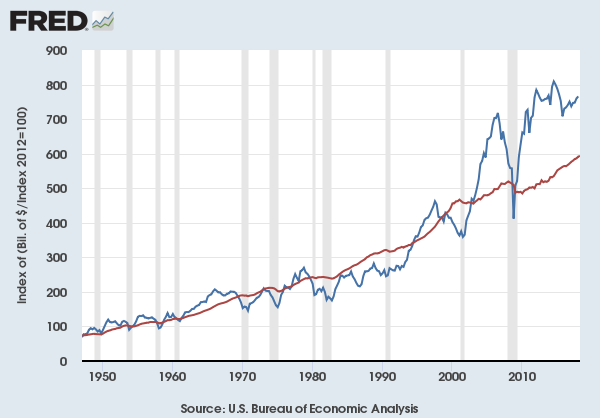Democracy Against Capitalism is a collection of essays written by Ellen Meiksins Wood. In the first essay, she says that many contemporary Marxists have abandoned the historical materialism which is central to Marx’ own thought. Here’s how she describes historical materialism:
A materialist understanding of the world, then, is an understanding of the social activity and the social relations through which human beings interact with nature in producing the conditions of life; and it is a historical understanding which acknowledges that the products of social activity, the forms of social interaction produced by human beings, themselves become material forces, no less than are natural givens. (Kindle Locations 491-494.)
This seems uncontroversial, in fact It’s really hard to believe anyone disagrees without relying on some other human-made theory.
She illustrates this idea with a sketch of the history of the development of capitalism, showing how capitalism separates politics and economics. This isn’t about the academic study of these fields, but about the way capitalism flowed from earlier times, primarily in the UK.
She starts with the proposition that a central problem for any society is producing the necessities of life and allocation of the production among members. That decision is political, not economic. The explanation begins with a definition of the state as the “complex of institutions” through which society organizes itself. This organization is an instrument of power, and exercises coercion through various means, including violence. Smaller social units, families or clans, owe certain common duties to the whole.
She says that in the earlier times, decisions about production and allocation were made by “public or communal authority”. (Kindle Loc. 676).
Whether or not the essential object of the state is to maintain exploitation, its performance of social functions implies a social division of labour and the appropriation by some social groups of surplus produced by others. It seems reasonable to suppose, then, that however this ‘complex of institutions’ came into being, the state emerged as a means of appropriating surplus product – perhaps even as a means of intensifying production in order to increase surplus – and as a mode of distributing that surplus in one way or another. Kindle Loc. 597.
I’m not sure what to make of this quote. She cites a book by Marshall Sahlins, Stone Age Economics for this proposition.
In the imperial period of Roman government, the supremacy of private property was reasonably well established, When the Roman Empire broke up, the state fragmented. Local feudal lords maintained control by a combination of feudal rights under whatever was left of a central authority, the offer of protection to the local people, and brute force.
Feudal Lords carried out the functions of the state in vestigial form, dispensing justice and providing and organizing defense, social responsibilities that went with their control over production and allocation. Gradually the central authority regained strength, and Feudal Lords ceded some of their duties and powers, but not control of the land or the work done by the people on the land or the right to control allocation of production. The story continues to the present, with the owners of private property maintaining their power to organize production and expropriate the surplus for themselves through their absolute right of control and ownership.
Wood only provides a sketch, and my retelling is a sketch of a sketch, but it’s compelling once you grant the premise that decisions about production and allocation are political issues. Of course, we don’t know how our Stone Age ancestors handled these things. Even so, the assertion that matters of organization of production and allocation of the products is a social matter is quite reasonable. After all, the rules that force that outcome are upheld by the power of the state, through violence and otherwise.
From there, the part of the story that starts in Feudal societies makes good sense. A lot of this history can be seen in the fights over English Land Law, the change from a political system where the king owned all the land to vesting of full title in aristocrats and eventually in the hands of ordinary people. Here’s the Wikipedia version.
This story helps us to see how we got to the place where absolute control of private property became central to our social structures. It wasn’t inevitable. The story is quite different in other countries. For example, in France, the King maintained his central role in the economy much longer, until the French Revolution. For an interesting discussion of the role of the King in the bread markets of France, particularly Paris, see Bernard Harcourt’s excellent book The Illusion of Free Markets, which I discussed here. Harcourt also discusses the arrangement that government should control punishment.
Perhaps as a result, even today the state plays a larger role in the French economy than in the US or the UK. As an example, the telecommunications businesses there are privately owned, but the government regulates the business tightly and insures competition. That keeps prices very low, and services high.
Along with the power to organize production, the capitalist system gives private interests the absolute right to whatever profits it can extract. This fact has such a long history, it appears to be the result of impersonal natural law to economists and others. In part this is because the absolute right to profit is hidden inside the absolute right to property. To the workers, the struggle for wages appears to be an economic struggle, not a political one. To the State, it means that there is little legislation and little regulation to protect ordinary citizens as workers or consumers, or the land, and the courts are always ready to strike down the new laws or to construe them so narrowly as to make them useless. And for most of its history, the US has seen fit to allow private interests to control Polanyi’s third fictitious commodity, money.
When economics began to emerge as a separate academic discipline in the 19th Century, it confronted this situation, and never questioned any of the social structures it found in place, especially the right of owners of capital to extract all profit, control the organization and production of most goods and services, and control the lives of the workers. The existing structures were written into the foundations of the two separated disciplines.
The leftist view, that such decisions are political, continued into the New Deal era, when government began to side with the workers and ordinary people. One landmark piece of legislation was the pro-union Wagner Act. Then, in the 1970s, Democrats joined what C. Wright Mills called the Capitalist Celebration, embracing capitalism as explained by economics. This led to the New Democrats, the Third Way Dems, the Blue Dogs, and the rest of the corporatist Democratic politicians. For the last 40 years, no one has seriously questioned this allocation of power.
There is a curious divide in the understanding of the allocation of production. Workers who own farms, for example, or artists, consider that the things they produce belong to them, and can be used or sold by them without regard to others. Workers who work for other people never make that connection. They do not think of the things they produce as theirs, or even partly theirs. They just assume that these things belong to the owners of capital. But consider this. Suppose a person who works for a tech company dreams up a new idea. Who owns that new idea? Probably the worker has the better claim. As a result tech companies routinely make employees sign contracts giving them ownership, and even that is not necessarily conclusive.
If all workers thought of themselves as having claims to their work product, we’d have a different kind of capitalism.


